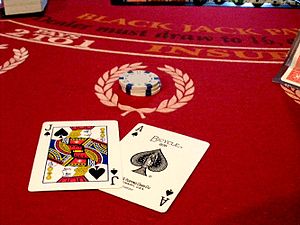The strategy for playing a hard or soft total of 21 in a game of blackjack seems like a no-brainer. You stand, you take your money, and you’re grateful for the hand you’ve been dealt. But one question that occasionally arises is whether or not you should take the “insurance” bet.
Get $3000 When You Download the Blackjack Game at CasinoTitan.

A Total of 21 in a Game of Blackjack
Insurance is a side bet that you can take if the dealer has an ace as her upcard. This bet pays off at 2 to 1, and it’s handled separately from your original wager. (So the only time you’ll win insurance is if you lose your main bet.) Most of the time (depending on the composition of the deck), there’s slightly lower than 33% chance that the dealer has a ten in the hole, which means you’ll win this bet a little less often than 1 out of 3 times.
[showSites]
(It’s called insurance because it pays out enough to make up for the loss you’d normally have when the dealer has a natural.)
The house still retains an edge on this bet. If the odds of the dealer having a ten in the hole were 33% or above, then this would be an even money or even positive expectation bet, the dealer actually has a slightly less than 33% of having that ten. That’s where the house gets its edge.
Of course, if you’re counting cards, and the count is positive, you’ll understand that the deck is rich in tens, and insurance becomes a positive expectation bet. That’s because there’s a higher chance of that downcard being a ten.
But is taking insurance ever the right play when you have a total of 21?
Yes, in fact, it is. When you have a natural, and the dealer has an ace showing, you have the following possibilities:
- A little less often than 1 out of 3 times, you’ll have a push, in which case you don’t win or lose any money.
- A little more often than 1 out of 3 times, the dealer will lose, and you’ll win 3 to 2 on your natural.
But ANY time the count is positive, the chances of the dealer having a natural go up. At that point, taking insurance is an even money or better bet, and you should take it.
Should You Ever Double Down on a Total of 21?
If you have an ace and a ten, you could theoretically double down. But is that the smart play?
Doubling down means that you place an additional wager, equal to the amount of your original wager, and take one–and exactly one–additional card.
It doesn’t take complicated thinking or advanced math to understand why you wouldn’t want to double down in this situation.
If you don’t double down, you win 3 to 2 on your money.
If you double down, you risk losing your original bet PLUS an additional bet, and if you still manage to win, you’re only gaining an additional amount equal to your original bet.
You’re better off taking the 100% chance of the 3 to 2 payout.
So How Do You Play a Total of 21
No matter how you got the total of 21, you always stand. You never hit. You never double down.
You take insurance IF you’re counting cards and the count is positive, but that’s a side bet–you still stand on your total in this situation.